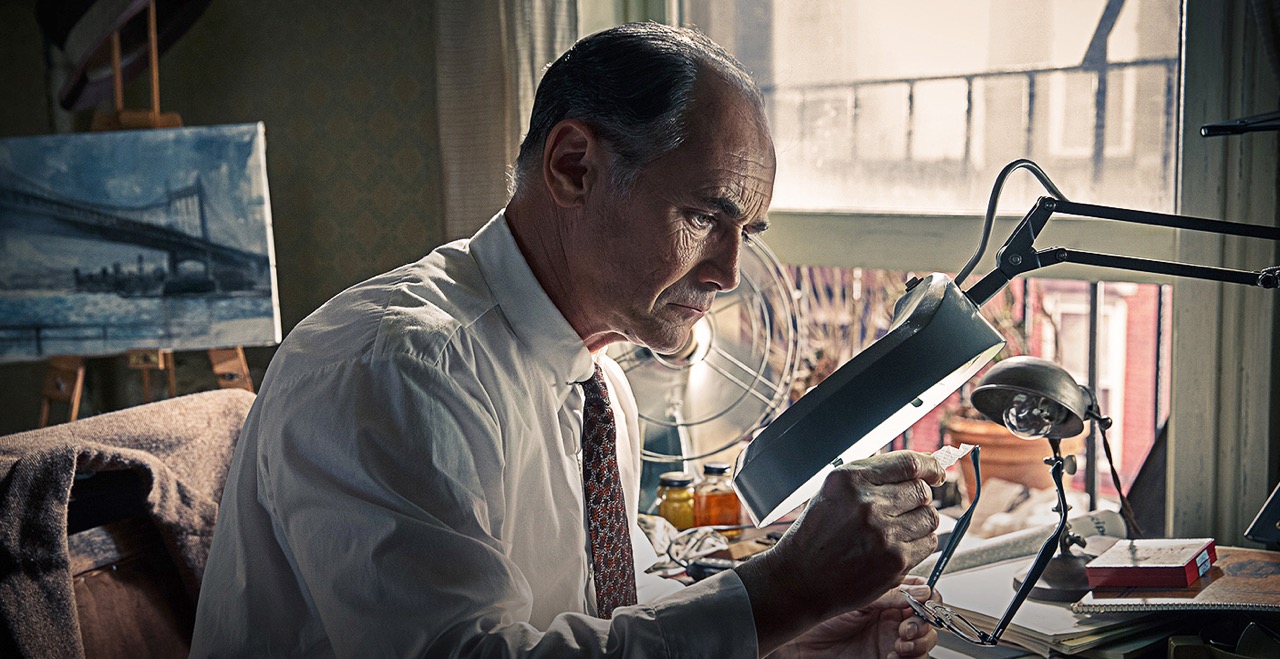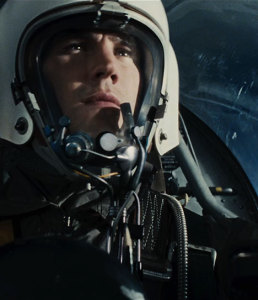Translating deep thinking into common sense
What Does it Mean to be an American?

By Vinay Kolhatkar
November 4, 2015
SUBSCRIBE TO SAVVY STREET (It's Free)
Steven Spielberg asks this question via his protagonist, James Donovan (played by Tom Hanks), early in the movie, Bridge of Spies.
Steven Spielberg asks this question of an FBI agent via his protagonist, James Donovan (played by Tom Hanks), early in the movie, Bridge of Spies.
Donovan answers his own question, and, in doing so, sets off a chain of events in play on the screen.
The New York Times asked this question recently. Like many a tabloid, the Times collected a whole lot of answers from a diverse group of people and set up a compilation, as if such answers are to be found in a subjective mishmash of haphazard guesswork.
Yet, in the midst of an arbitrary patchwork, there was some gold—
“Being American means protection by the law. Anyone can say whatever they want and, even if I don’t agree with them, they’re still protected by the law it’s my job to enforce. That’s their freedom. That’s their right.”
Sean Larkin, 40, Sergeant with the Tulsa Police Department’s gang unit.
James Donovan would have been proud of Sean Larkin.
Born in 1914, James Donovan became a partner in a New York based law office in 1950. In 1957, he reluctantly took on the case of Rudolph Abel, accused of being a Russian spy. The decision of who would defend Rudolf Abel was left to the Brooklyn Bar Association, who in turn selected James Donovan, at the time working as an insurance lawyer. What looked like a poisoned chalice, in the end, wasn’t—when Donovan finally left the stage in 1970, it was as a much-vaunted hero.
Donovan the purist took the case, believing sincerely that everyone was entitled to a defense.
In the movie, an FBI agent named Hoffman confronts Donovan, requests him to bend the rule book, to patriotically do his duty in ensuring the Russian faces the gallows. Donovan inquires as to whether Hoffman’s ancestry is German. Piqued, Hoffman asks, ‘Yes, but why does it matter?’
Donovan responds—‘I am of Irish descent. It doesn’t matter where you come from, where anyone comes from. Here, in America, we have a rule book that is called the Constitution. It’s sacred. We don’t bend the rules. That’s what makes us American.’
Even Donovan’s family faces public contempt for here is a man who puts principle above patriotism. The film adds a few contrived incidents, but is largely true to the real story. The legal system is rigged. Abel is convicted. Donovan pleads with the judge for Abel’s life—‘You never know. We might get one of our own trapped over there, and we may need to do a prisoner exchange.’
 Indeed, that’s the way the game actually played out.
Indeed, that’s the way the game actually played out.
A U2 reconnaissance plane is shot down. The pilot is captured, because he does not “spend his dollar”—the Federal agent euphemism for pricking yourself with a cyanide needle inserted inside a dollar coin—“if you are captured, you must spend your dollar.”
Now the U.S. Government is worried about a head full of classified information yielding to torture, displayed viscerally, versus keeping a Russian spy, who won’t yield to the mild interrogation of those who play by the rules. The Abu Ghraib discoverers would be shocked at this asymmetry, but it’s plausible. For the Fifties, it is.
Donovan’s focus, however, is not on getting back the head full of information that may crack under pressure, it’s on saving a human being. That seems like the same thing, until another innocent American, a young economics student from Yale, crosses over to the East German side, to warn his love, just as the Berlin Wall is getting laid—brick by brick. He ends up on the wrong side of the wall, an unwitting prisoner of those on the wrong side of history.
The U.S. Government appears to care naught for the student, the pilot is their only concern; if the Germans lacerate the student—it might only reveal what Yale taught him. Hardly classified.
It’s a set up that a screenwriter would find hard to contrive out of the blue. When truth is more freakish than fiction, however, it’s time someone sculpts it into a drama. Spielberg has.
Donovan, asked to negotiate as a private citizen, sees in the student’s plight a human being unstuck by his gallantry. The Russians might give him the pilot for the spy, the East Germans the student for the spy, but Donovan wants to have his cake and eat it too.
So now we have a game of triple machinations—who is playing whom? Donovan and his own Government don’t see eye to eye, principle fights patriotism. The East Germans are not talking to the Russians—or are they? One morning Donovan is talking with the Russians, one evening he is trying to clinch a deal with the East Germans.
It’s a set up that a screenwriter would find hard to contrive out of the blue.
When truth is more freakish than fiction, however, it’s time someone sculpts it into a drama. Spielberg has. The opening credits portend “inspired by true events,” not, as is often said, “based on a true story.” Nevertheless, notwithstanding this cautionary caveat, as far as adaptations go, Bridge of Spies is almost unnaturally close to the chronicle. Right down to the looks. The casting is immaculate on that.
 Hanks shines, but perhaps not enough to warrant an Oscar nomination. The cinematography is excellent, yet, for some strange reason, the most scenic episodes—Germans trying to cross the border getting shot at, the U2 spy plane’s downing over Russian airspace—are underplayed on screen time, despite the long 141-minute schedule. A flaw, but not a major one. Authenticity is fully on track the whole time, a vital for a period piece—East Berlin is ominously totalitarian, cold, and capable of switching unemployed youth into street hoodlums at the press of a button.
Hanks shines, but perhaps not enough to warrant an Oscar nomination. The cinematography is excellent, yet, for some strange reason, the most scenic episodes—Germans trying to cross the border getting shot at, the U2 spy plane’s downing over Russian airspace—are underplayed on screen time, despite the long 141-minute schedule. A flaw, but not a major one. Authenticity is fully on track the whole time, a vital for a period piece—East Berlin is ominously totalitarian, cold, and capable of switching unemployed youth into street hoodlums at the press of a button.
Donovan’s principled resolve—“every life matters”—keeps us inspired, though we never get to know the pilot and the student well enough to care deeply for both of them—and even then, how would we choose whom to save? That’s about the only other flaw, again minor, in an otherwise entertaining, understated work of film-making brilliance.
It’s the adaptation that is the magic in the pudding—the film and its director (a Steven somebody) may rock into the Academy award nominations, but the screenplay adaption decidedly deserves the gong, unless something even better comes along. Matt Charman, Ethan Coen, and Joel Coen, take a bow—this is a masterpiece that dramatizes the need to speak truth to power.
Founding Father Samuel Adams
The time has indeed come, and it is profoundly unnatural for Hollywood to undertake the inspiring to make us stand up against the (vain and) aspiring. But we must take our uplifting pleasures wherever we find them—and the brief window on Donovan’s life is one hell of an appealing niche.








An excellent review that makes me want to go see it. Thanks.
Thank you, Mike N.
A good review of a good movie. The one thing that bothered me about the movie is that the Russian spy is portrayed too sympathetically. As Donovan (in the film) sees it, he is just doing for his country what one of ours would do for the US. Except that the US didn’t kill and imprison millions of its own citizens and grind the rest into dust. Still the portrayal of the spy is one of the best things in the movie and the actor who played him might win an Oscar for best supporting actor.
Thank you, Kurt. Indeed, the over-sympathetic view of the Russian spy is an issue, because the blind patriotism contradicts the Americanism that Donovan pursues.. The much-acclaimed Mark Rylance (http://www.imdb.com/name/nm0753314/?ref_=tt_cl_t1) played him in a highly understated way, and it may well earn him a supporting Oscar.
I have not seen the movie, but the book that Donovan wrote about the entire experience jibes well with Vinay writes. I don’t know what the film portrays, but Abel–whose real name was William August Fisher, born in England to real Bolshie parents, who headed back to Russia with William when was in his 20’s–appears, in perspective, not to have been an important Soviet agent, despite spending nine years in Brooklyn. He recruited no other agents; he does not seem to have succeeded in radio transmissions back to his masters, although he reported in other ways, and no one seems sure what important U.S. intelligence he divulged. But then, reading the career of Gary Powers, he did not have access to a great deal of intelligence, either, although he did know everything about spy planes, and also managed to allow the U-2 to crash, more or less intact, in Russia. The grotesue comparison in this case is that young Powers was interrogated by hideous, sadistic bully boys of the KGB for two years before he “confessed and apologized.” As Ayn Rand pointed out in an article, he should have had prior public permission from his government to apologize for anything and to say anything–except for actually secrets. He appears to have comported himself well and was recognized and decorated for it. As for Abel, he mentioned that once during his detention by the FBI, when they spirited his off to Texas for three weeks without arrest or charge– an agent swatted him in the face, knocking off his glasses. A lot of the shock and awe generated by Abel’s capture was that that very month Sputnik went into orbit. At any rate, the Soviet spies of crucial importance were those who obtained information for Russia about manufacturing atomic bombs. That would be Julius and Ethel, who were satisfyingly deep friend–although, admittedly, they were brave and true within their context. One thing that Donovan checked out, early on–because it troubled him–was the important distinction between an American who becomes a spy, betraying his country, and a spy in service of a foreign power. He actually checked with leading British barristers to see what the legal tradition showed. They confirmed that for many decades, British law viewed foreign agents working for a foreign power as less heinous than British citizens working for foreign powers, betraying their country. One thing I greatly enjoy about this story is that it takes place entirely in Brooklyn, where I lived for some years, the whole time my son, Ethan, was growing up. Abel lived on Hicks Street in very fashionable Brooklyn Heights; he had his photographic/spy studio on dumpy Fulton Street. Donovan and his family lived in a duplex apartment on highly fashionable Prospect Park West, in the Park Slope area of Brooklyn, right along the huge Prospect Park, where Abel had some of his dead drops. Ethan and I spent many, many days in the Park; I did my runs there. What is more, Abel was tried in the Federal District Court in Brooklyn–the court of the Eastern District covering Brooklyn and all of Long Island. The legendary Southern District, which does all the prosecuting/persecuting of Wall Street, covers Manhattan. The court of the eastern district is only a block or two from Ethan’s high school and I did jury duty there on a murder case–we convicted.